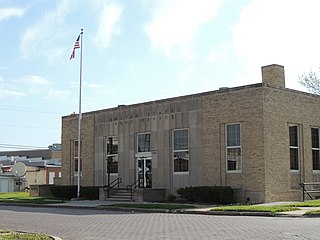
Nicodemus National Historic Site, located in Nicodemus, Kansas, United States, preserves, protects and interprets the only remaining western town established by African Americans during the Reconstruction Period following the American Civil War. The town of Nicodemus is symbolic of the pioneer spirit of African Americans who dared to leave the only region they had been familiar with to seek personal freedom and the opportunity to develop their talents and capabilities. The site was named, at least in part, for a legendary African-American slave featured in abolitionist Henry Clay Work's "Wake, Nicodemus (1864)." It is a mystical story of an old slave died away and buried in a hollow tree who had asked to be awakened on the Day of Jubilee.
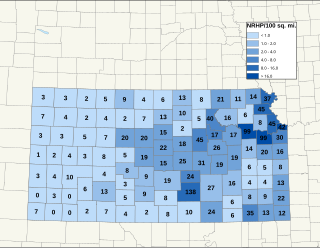
There are over 1,400 buildings, sites, districts, and objects in Kansas listed on the National Register of Historic Places in Kansas. NRHP listings appear in 101 of the state's 105 counties.

The Delaware River is a 94-mile-long (151 km) river located in the northeastern part of the state of Kansas. The Delaware River basin drains 1,117 square miles (2,890 km2) from the outflow of the Perry Lake reservoir. The river has been classified as a Category 1 watershed by the Kansas Department of Health and Environment, meaning that the watershed is in need of immediate restoration and protection. The river is one of the major tributaries of the Kansas River.

Valentown is the name of an abandoned shopping center located in Victor, New York. The structure was built in 1879 by Levi Valentine and is operated today as a museum. It is included on the National Register of Historic Places. The Official Web Site is located at http://historicvalentownmuseum.org.
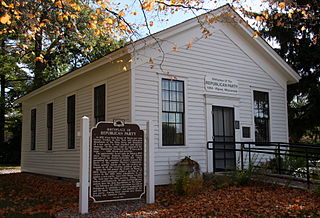
The Republican Schoolhouse, also known as Little White Schoolhouse or Birthplace of the Republican Party, is a historic former schoolhouse at 305 Blackburn Street in Ripon, Wisconsin. Built in 1853, it was designated a National Historic Landmark for its role in the 1854 founding of the Republican Party. It is now a local history museum.

Old Catonsville High School, also known as St. Mark's School, is a historic school building located at Catonsville, Baltimore County, Maryland. It is a masonry schoolhouse which consists of a one-story, single bay structure and a three-story, four bay addition. In 1885 the school was designated a high school and in 1910 the property was sold to the Catholic Church.

The West Ward School is a historic school at 39 Prospect Street in Wakefield, Massachusetts. Built in 1847, it is the only surviving Greek Revival schoolhouse in the town. The building was listed on the National Register of Historic Places in 1989. It is now maintained by the local historical society as a museum property.

Wallington Cobblestone Schoolhouse District No. 8 is a historic one room school located at Sodus in Wayne County, New York. The Federal style, cobblestone building is a one-story, three bay, center hall gable roofed structure with a louvered, gable roofed bell tower.

Roe Cobblestone Schoolhouse is a historic one room school located at Butler in Wayne County, New York. The cobblestone building is a one-story, 28 feet long by 22 feet deep, three bay wide structure. It was built about 1820 and is constructed of irregularly shaped, multi-colored, field cobbles. It ceased to function as a school in 1932, used as a single family residence, and is now operated as a schoolhouse museum by the Butler Historical Society, which also operates the Butler Church Museum. Both museums are open on the first Saturday of the month from May through October.
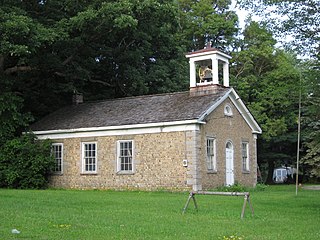
Schoolhouse No. 6 is a historic one room school building located at Guilderland in Albany County, New York. It was built in 1860 and is a one-story cobblestone building built of coursed cobblestones with smooth ashlar quoins. It features a curvilinear hipped roof topped by an open bell tower. Also on the property is a contributing privy.

District School No. 1, also known as Cedar Hill Schoolhouse, is a historic school building located in the Town of Bethlehem in Albany County, New York south of the capital. It was built in 1859 and expanded in 1907. It is a one-story, rectangular brick building, seven bays by three bays in the Italianate style with later Neoclassical details. It features an elaborate domed cupola. School use ceased in 1962. Since 1965 it has housed the Bethlehem Historical Society and museum.
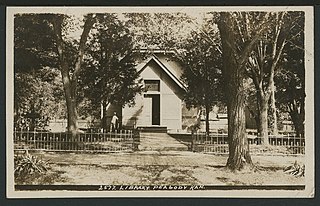
Peabody Historical Library Museum, also known under the older name of Old Peabody Library, was listed on the National Register of Historic Places (NRHP) in 1973. It is located in the Downtown Historic District of Peabody, Kansas. The building has state significance because it was the first free tax-supported library in Kansas.

The Old Farm Schoolhouse, also known as the Brick School, is a historic schoolhouse at Park Ave. and School St. in Bloomfield, Connecticut. Built in 1795, it is the oldest surviving public building in Bloomfield. It was listed on the National Register of Historic Places in 1972.
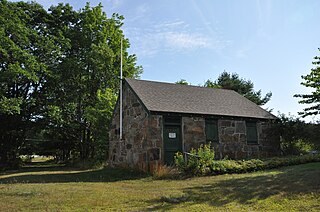
The Stone Schoolhouse is a historic school building on Bay Point Road in Georgetown, Maine. Built sometime before 1821, it is one of the state's small number of surviving stone district school buildings. It is now a museum property maintained by the local historical society. It was listed on the National Register of Historic Places in 1977.

Mill Rock School is a historic one-room schoolhouse located south of Baldwin, Iowa, United States. It is one of over 217 limestone structures in Jackson County from the mid-19th century, of which 12 are school buildings. This school building was built in 1869 by Abner Hunt and P.A. Downer. The stone blocks that were used in the construction of this rectangular structure vary somewhat in shape and size, and they were laid in courses. The window sills and lintels are dressed stone. There is a brick chimney on the west elevation, and two entrance doors on the east elevation. Having two entrance doors is unusual for rural Jackson County schools. A name and date stone is located in the east gable.

Frankville School, also known as the Frankville Museum, is a historic structure located in the unincorporated community of Frankville, Iowa, United States. It was built in 1872 by W.H. Hopper, replacing an older building from the mid-1850s. It is a two-story, stone vernacular structure, capped with a gable roof. The stone is rock-faced ashlar limestone. The stones on the front facade are carefully dressed compared with those on the other elevations. The lintels and window sills are blocks of rock-faced stone, except for those on the front. On the front, carefully dressed stone voussoirs and keystones are used for the round arches for the main entrance and the window above. High school classes were added in the 1920s. In 1958 the school was reduced to kindergarten and 7th and 8th grades. It closed in 1962. The following year the Winneshiek County Historical Society acquired the building and operated a museum in it. It remains in the community's park.
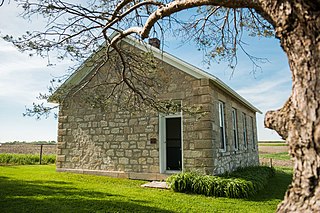
The North River Stone Schoolhouse is a historic building located north of Winterset, Iowa, United States. Built in 1874 of coursed native limestone, the one-room schoolhouse educated local students until it closed in 1945. The building features quoining on the four corners of the exterior, four windows capped with stone lintels on the east and west elevations, and an off-center doorway on the main (south) facade. From 1962 to 1973 the building was restored, and it opened as a school museum operated by the Madison County Historical Society. The building was listed on the National Register of Historic Places in 1977.

The Former Audubon County Courthouse, also known as the Audubon County Historical Society Museum, is a historic building located in Exira, Iowa, United States. Court proceedings were first held in a schoolhouse in Hamlin's Grove after Audubon County was established in 1851. The county seat was relocated to Exira ten years later, and a disagreement erupted over where the county seat should be located. The county board of supervisors made an appropriation for a new courthouse in 1871, but its construction was delayed due to the disagreement. Exira eventually won and officials constructed the courthouse for about $2,200. The Exira Hall Company was established to build the two-story, frame structure. County offices were located on the first floor and the courtroom was located on the second floor. The county seat was moved to Audubon in 1879.

The Old Depot Museum is a history museum located in Ottawa, Kansas. The focus of the museum is primarily on the regional history of Franklin County, and the importance of trains to the development of small towns. It features history of local Native Americans, local industries, and has accurate recreations of historical rooms. The Old Depot Museum is on the National Register of Historic Places.


